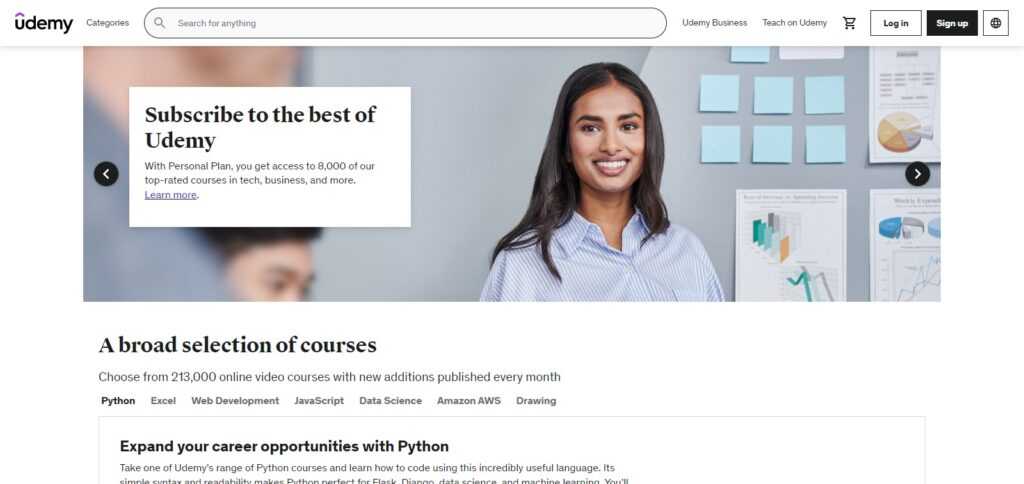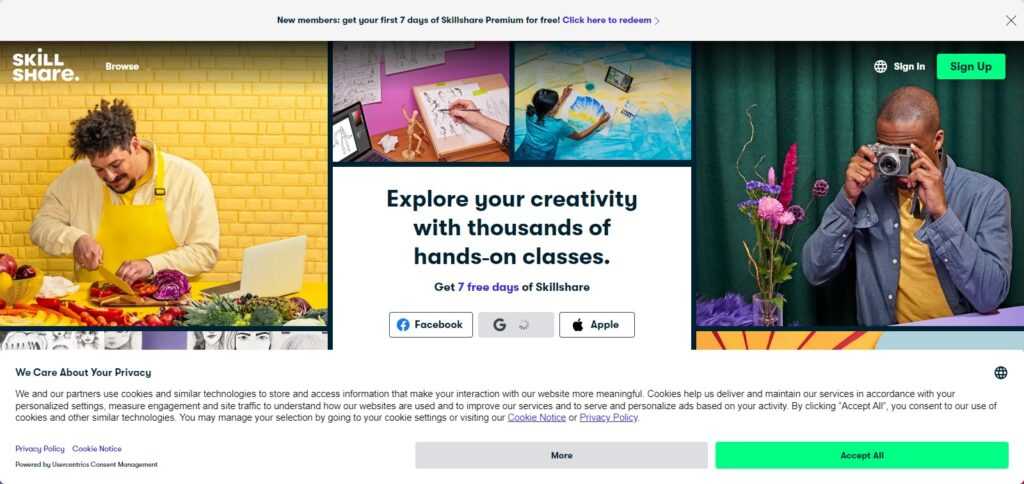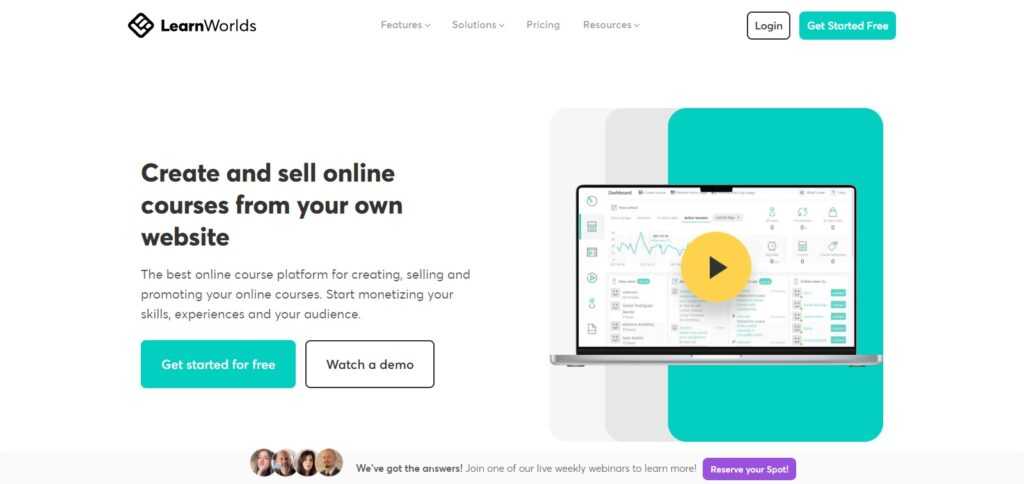There are numerous online platforms for teaching that can be used to make money. Udemy, a well-known online learning marketplace, is one of the top platforms. Udemy enables teachers to produce and market online courses on a variety of subjects, including business and technology as well as personal growth and hobbies.
Udemy offers educators a user-friendly interface and thorough assistance, making it simple to develop and promote courses to a global audience. In order to market their courses and draw students, instructors can also take advantage of Udemy’s marketing resources. With over 35 million users globally, Udemy offers teachers a sizable and varied audience to target and a means of making money from their online courses.
Furthermore, the revenue sharing mechanism used by Udemy enables teachers to make up to 97% of the revenue generated by their courses, making it a highly profitable platform for those looking to monetize their expertise and skills through online teaching.
What is an Online Teaching Platform?
A web-based platform known as an online teaching platform enables educators to design and deliver courses online. These platforms offer features and tools that instructors can use to design and run online courses, including developing lesson plans, monitoring student development, and promoting teacher-student interaction.
- Advertisement -
To improve student engagement and learning results, online teaching platforms frequently incorporate a variety of multimedia components, such as video lectures, interactive exercises, and quizzes.
Online learning environments are practical and adaptable learning environments since students can access courses on them from any location with an internet connection. Popular online education platforms include Teachable, Skillshare, Coursera, and Udemy.
How can I start teaching online?
There are various steps you may take to get started teaching online, which can be a terrific opportunity to share your experience and knowledge with a large audience:
Determine your topic: Select the subject or topic you want to teach. Take into account your speciality, your personal interests, and the interests of potential students.
Decide on a platform: Find an online teaching platform that fits your interests and aims by doing some research. Udemy, Teachable, Coursera, and Skillshare are a few of the well-known sites.
Plan your strategy: Create a syllabus or a course outline. Take into account the evaluations, course material, learning objectives, and any additional materials you will need to develop.
Create course content: Make course materials generate interactive games and quizzes for your course, record lectures on video, produce course materials, generate presentations or slides, and more.
Set a cost: Establish the cost of your course. Take into account the benefit you’re offering, the time and effort needed to build the course, and the costs of comparable courses on the platform you’ve selected.
Promote your course: Use the platform’s marketing resources and social media to advertise your course to prospective students.
Set out on your course: Launch your course and start teaching as soon as your course content and marketing efforts are finished!
Best Online Teaching Platform To Earn Money
Thinkific
Users of the well-known online learning platform Thinkific can design and market online courses. The platform offers a variety of tools and features to assist instructors in developing and marketing their courses, including editable course templates, tools for creating multimedia content, and an integrated payment method. In addition, Thinkific offers a complete set of analytics and reporting tools to aid teachers in monitoring student development, engagement, and course effectiveness.

Thinkific’s user-friendly interface, which enables teachers to easily develop and manage courses without any prior technical expertise or experience, is one of its distinguishing advantages. The platform also gives teachers a variety of customisation choices so they may personalise and brand their courses to better suit the wants and needs of their intended audience.
Thinkific offers a range of pricing plans, including a free plan with limited features and a range of paid plans with more advanced features and tools. Overall, Thinkific is a reliable and user-friendly platform for instructors looking to create and sell online courses.
Udemy
On the well-known online learning site Udemy, instructors can design and market online courses on a variety of subjects. The platform provides a full range of tools and features to assist teachers in designing and running their courses, including an intuitive course creation interface, tools for creating multimedia content, and an integrated payment method.
With over 35 million students globally, Udemy has a sizable and diversified audience, which is one of its distinguishing qualities. Because of this, Udemy is the perfect platform for instructors who want to reach a large audience and make money by teaching online.

Additionally, Udemy offers instructors a wealth of resources and support, including marketing tools and analytics to help them sell their courses and monitor student participation and development. With the revenue-sharing arrangement that Udemy offers, instructors can receive up to 97% of the money made by their courses. While Udemy imposes a fee for course promotion, which might have an impact on overall profitability, this revenue-sharing approach is competitive in comparison.
Udemy is, all things considered, a trustworthy and complete platform for instructors wishing to develop and market online courses to a worldwide audience. Udemy is the perfect platform for instructors wishing to monetize their knowledge through online teaching because of its sizable and diverse audience, extensive support and resources, and user-friendly layout.
Skillshare
A variety of courses on artistic and professional skills, including design, photography, writing, and entrepreneurship, are available on the online learning platform Skillshare. Students must subscribe to the platform in order to access all courses, which can cost a monthly or yearly price.
In order to build and manage their courses, teachers can use a variety of tools and features offered by Skillshare, such as a course design interface, tools for creating multimedia content, and an extensive set of analytics and reporting tools. Additionally, the platform gives instructors the chance to take part in revenue-sharing, where they can receive a share of the subscription revenue from their courses.
The emphasis Skillshare places on community and collaboration is one of its most notable characteristics. The website offers a variety of tools and chances for interaction between students and teachers, including as discussion boards, live events, and project-based tasks. As a result, a welcoming and cooperative learning environment is created, which encourages creativity and innovation.

Despite the fact that Skillshare has many benefits, it’s crucial to remember that the platform is largely geared towards creative and professional talents, which can make it less appealing to instructors in other sectors. The revenue-sharing concept might not be as aggressively marketable as other platforms that provide a cut of course sales.
Overall, Skillshare is a complete platform with a focus on the community that gives teachers a variety of tools and capabilities to build and market courses The emphasis Skillshare places on community and collaboration is one of its most notable characteristics. The website offers a variety of tools and chances for interaction between students and teachers, including as discussion boards, live events, and project-based tasks. As a result, a welcoming and cooperative learning environment is created, which encourages creativity and innovation.
Teachable
Overall, Skillshare is a complete platform with a focus on the community that gives teachers a variety of tools and capabilities to build and market courses.
Teachable is a platform for online instruction that enables users to design and market online courses. The platform provides a variety of tools and features to assist teachers in developing and managing their courses, such as an easy-to-use course development interface, tools for creating multimedia content, and an integrated payment gateway.
Teachable’s adaptability and customizability possibilities are among its best qualities. The platform lets teachers add their own branding and design components to the course pages they create. Additionally, Teachable gives teachers the chance to design and market several courses on a single platform, which can be a convenient and affordable choice for instructors wishing to make money by teaching online.

In-depth analytics and reporting tools are also provided by Teachable to assist teachers in monitoring student progress, engagement, and course performance. A variety of pricing options are available for the platform, including a free plan with restricted functionality and a number of subscription plans with more sophisticated features and tools.
Teachable is a comprehensive and adaptable platform, but it’s crucial to remember that in order to set up and administer courses successfully, it does require some technical knowledge and expertise. The revenue-sharing concept might not be as aggressively marketable as other platforms that provide a cut of course sales.
Podia
Podia is a comprehensive online teaching platform that enables users to design and market memberships, digital downloads, and online courses. The platform provides a number of features to assist teachers in developing and managing their courses, such as an easy-to-use course development interface, tools for creating multimedia content, and an integrated payment gateway.
Podia places a strong emphasis on constructing a seamless and simple user experience, which is one of its most notable qualities. Because of the platform’s clear and uncomplicated design, instructors may easily develop and customise their course sites. Additionally, Podia gives teachers the chance to produce and market a variety of digital products on a single platform, which can be a practical and affordable choice for teachers wishing to monetize their knowledge and abilities through online teaching.

In-depth analytics and reporting capabilities are also provided by Podia to assist teachers in monitoring student progress, engagement, and course performance. A 14-day free trial and a number of subscription plans with more sophisticated features and capabilities are both available on the platform.
Despite being an extensive and user-friendly platform, Podia does have some restrictions regarding the capabilities for customising courses and marketing tools. The revenue-sharing concept might not be as aggressively marketable as other platforms that provide a cut of course sales.
LearnWorlds
A platform for online instruction called LearnWorlds enables users to design and market online courses as well as provide coaching and webinars. The platform provides a number of features to assist teachers in developing and managing their courses, such as an easy-to-use course development interface, tools for creating multimedia content, and an integrated payment gateway.
The emphasis LearnWorlds places on interactive and interesting course material is one of its distinguishing qualities. The platform provides a variety of tools for creating multimedia material, such as the ability to record audio and video, create interactive tests and assignments, and use gamification. Additionally, LearnWorlds gives teachers the chance to produce and market a variety of digital products on a single platform, which might be a practical and affordable way for teachers to monetise their courses expertise and skills through online teaching.

In-depth analytics and reporting capabilities are also provided by LearnWorlds to assist teachers in monitoring student progress, engagement, and course performance. A 30-day free trial and a number of subscription plans with more sophisticated features and tools are both available on the site.
Despite being a thorough and interesting platform, LearnWorlds does have some restrictions regarding the ability to customise courses and marketing tools. The revenue-sharing concept might not be as aggressively marketable as other platforms that provide a cut of course sales.
Monetize Your Content With a Custom Online Course
A fantastic method to sell your work and impart your knowledge to others is by developing a unique online course. To get you started, follow these steps:
Select a topic: Think about your area of expertise and the interests of your target audience. Look for areas where the present content is lacking and decide where you might offer value.
Choose the format: Choose the delivery method for your material. Will it be written content, audio files, or video lectures? Will there be tests, tasks, or group discussions?
Make the content for your course: Create your course materials in a style that is interesting, educational, and simple to understand. To clarify difficult ideas, think about using visual aids like infographics or diagrams.
Select a platform: Teachable, Thinkific, or Kajabi are just a few of the many online course platforms that are accessible. Choose the platform that best suits your goals and budget after researching each one.
Price your course: When determining how much to charge for your course, take into account the time and effort you invested in developing it as well as the benefits it offers your audience. Establish a fair price that represents the calibre of your content after researching the costs of comparable courses.
Use your current social media channels and email databases to advertise your course. Offer discounts or rewards for enrolling early, and think about collaborating with affiliates or influencers to increase your exposure.
Although it takes a significant amount of time and work to create a personalised online course, it can be a highly lucrative way to monetize your content and share your expertise with others.
Conclusion
Your objectives, abilities, and teaching style will determine the ideal online teaching platform for you to make money on. Udemy, Skillshare, Teachable, and Coursera are a few of the greatest options out now, each with their own advantages and disadvantages.
While Skillshare concentrates on courses that are creative and skills-based, Udemy is a well-known website with a vast user base. While Coursera offers partnerships with prestigious universities and institutions, Teachable gives total control over course pricing and branding.
Think at things like course creation tools, commission costs, marketing assistance, and course themes when selecting a platform. Whatever platform you decide on, keep in mind that success in making money through online teaching depends on producing high-quality courses and doing efficient marketing.
FAQ
What type of content can I monetize on these platforms?
You can monetize almost any type of content, from business and technology courses to creative and lifestyle classes. The key is to find a topic that you are passionate about and that has a demand in the market.
How much can I earn on these platforms?
Your earning potential depends on various factors, including the pricing of your courses, the number of students enrolled, and the commission fees charged by the platform. Some instructors make a few hundred dollars per month, while others earn thousands.
Can I use multiple platforms to monetize my content?
Yes, many instructors use multiple platforms to reach a broader audience and increase their earning potential. However, be aware of any exclusivity agreements that may limit your ability to sell your content elsewhere.
Do I need to have teaching experience to create an online course?
No, you don’t need to have formal teaching experience, but you should have expertise in the subject matter you are teaching. Focus on creating engaging content that provides value to your students, and you will be successful.
How do I promote my courses on these platforms?
Most platforms offer built-in marketing tools, such as email campaigns and social media integrations. You can also use your existing social media channels, email lists, and other marketing strategies to drive traffic to your courses.











